Judging by my recent posts on Mass Effect one might come to the conclusion I was a Fallout 3 fan. Both games are often compared when discussing modern western RPGs. I think their relationship is quite complimentary. The one has strengths where the other has weaknesses. Nevertheless, I indeed think that Fallout 3 offers a more complete, insightful and better crafted experience.
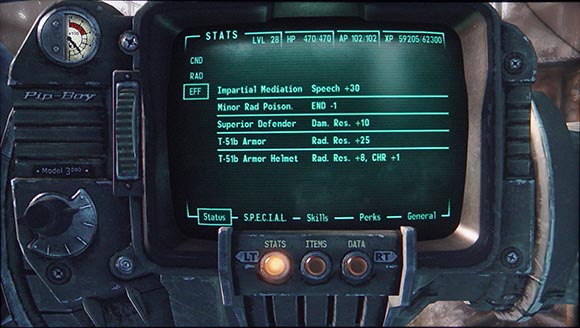
-1 Endurance due to minor radiation poisoning. No word about the adverse effects of not eating or sleeping for weeks.
But that doesn’t mean it is without flaws. This time around I would address a particular, not quite obvious problem. It is a hereditary disorder – a feature that Fallout 3 inherited from previous RPGs but one that turns out to have devastating effects in the specific environment of Fallout 3. I’m speaking of the fact that like in many RPGs, the mere survival of your character in the wilderness is taken for granted.
Everybody who ever found themselves giving up even the smallest bit of everyday comfort – by going camping for example – will acknowledge that mere survival is not a trivial matter. The human biology has a daunting list of requirements that need to be tended to every day. Doing so in the middle of – say – a forest is already quite a challenge. It may be even almost impossible in more exotic environments.
You need nourishment, including both: food AND water. And this is especially true if you decide to engage in physical activities. You need rest which includes some form shelter from the elements. And things get especially nasty if you happen to require medical treatment. Wounds and bruises heal very slowly (if at all) if they are not cleaned properly and if you don’t take some extra rest. They also severely limit your physical performance. A seemingly minor wound like a broken bone could even mean death if you found yourself alone and far from a safe haven. This would be not so much because of the actual wound but because of the impairment caused by said wound.

Look, people have written books about it. Isn’t there some material for gameplay?
But RPGs often chose to blissfully ignore that aspect of human existence. You characters will hack and slash away at enemies, get hit by all sorts of blunt and sharp weaponry, scorched by all sorts of thermal, electrical, or even radioactive energies from natural or super-natural origins. No matter how badly hurt, their ability to cross great stretches of land is never hampered. All wounds and bodily needs can be tended to by simply chugging down yet another flask of “magical potion”. In some cases you may chose to rest one night at an inn to restore yourself fully just overnight.
Things got even worse recently, when games started to seamlessly simulate the diurnal cycle, exposing your character’s super-human ability to stay awake and active for weeks at a time without meals (and consequently without going to the toilet).
Also troublesome is how game designers tend to throw all the bodily functions into one big category of “Health Points”. Wounds are represented by subtracting from a budget of said health points. But players can restore health points by tending to other, quite unrelated bodily needs such as eating something. If only real medical treatment was that easy. Cancer? Have a sandwich.
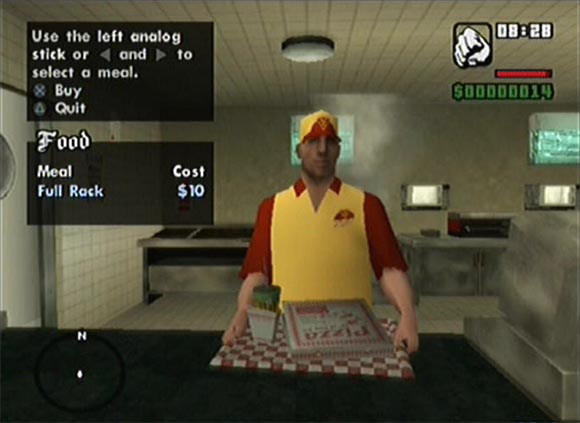
Food in GTA: San Andreas doesn’t provide nourishment but does make you fat. On the other hand, it heals wounds and you don’t get hungry anyway.
And yet, for most simple action games this is quite acceptable. When playing an action shooter like Call of Duty, you don’t want to be held back by realistic wounds. Already the first hit would be probably fatal or at least disqualify you for further combat. That’s not fun. Also, in some RPGs – like Mass Effect – it’s quite ok to assume that talking care of food, shelter and medical support happens automatically, off-screen.
But Fallout 3 is different. Fallout 3 takes place in a post-apocalyptic world where survival is supposed to be harsh. In fact, the very nature of that world is defined by the struggle of it’s inhabitants to survive against the odds. Introducing the same survival-by-default undermines that setting.
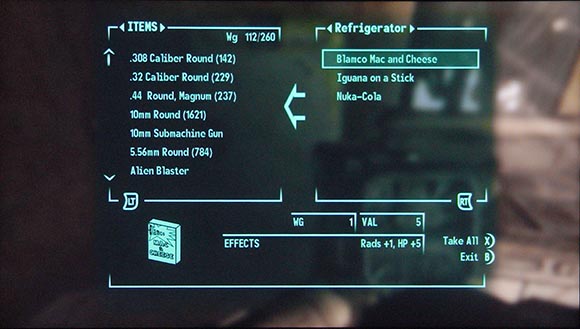
Found some 200 year old snacks and a iguana-on-a-stick. I think I’ll stick to Stimpacks for now.
So for example, in Fallout 3 there is a lot of quite yucky food you can scavenge from abandoned houses. Dirty restaurants sell stuff like the infamous iguana-on-a-stick. Going trough the menu really puts you in a post-apocalyptic mood. You can drink water from toilets and other disgusting sources which are reminiscent of the toilet scene from Trainspotting. Eating the food or drinking the water will even give you a couple of RADs worth of radiation. Yet, you can play through the entire game without eating or drinking even one bit of that stuff. You can pretty much survive on Stimpacks, syringes with magic potion inside. And you really need them only for combat-inflicted wounds because your character will never grow hungry or thirsty anyway. There are also hospitals and makeshift clinics but they can be avoided as well. The treatment they offer can be just as well provided by the Stimpacks. Stimpacks can even restore crippled limbs. There is almost nothing they can’t do. The only thing they don’t help with is with radiation. But don’t worry, there is Rad Away a different drug that simply heals all damage done by exposure to radiation. Again, radiation in real world is a quite different and much, much more nasty beast.
All drugs are ubiquitously available and while they are more expensive than food, you can afford buying them in large quantities pretty early in the game. A playthrough without even one bite of post-apocalyptic food or one visit to the horror doc is entirely plausible for the even most casual player. The only cases when you do it is maybe out of curiosity.
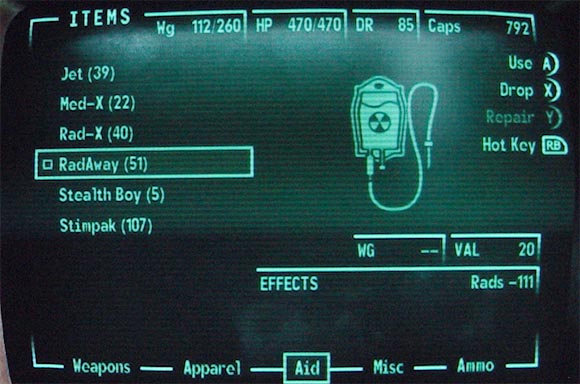
Typical late-game inventory. Around 100 Stimpacks and 50 Rad Aways. At some point you give up buying them because it seems like you won’t use them up anyway… but yeah, water is super-important for survival and stuff. Whatever.
Another funny thing is how you can fully restore your health by simply going to bed. You can even specify exactly how long you want to sleep. But even 1 hour of sleep is already enough to bring your health points back to maximum. There are no drawbacks from going on for weeks without sleeping and even when you do go to sleep, there is hardly any incentive to have a healthy 6-8 hours of it. Yes, there is a “well rested” status you can obtain by sleeping longer but it wears off quickly, often before you even arrive at a scene where action happens. And it isn’t that big of a deal anyway.
You could dismiss all of this as a bunch of little unrealistic flaws that slight strain your suspension of disbelief, if it wasn’t for one fatal mistake of the game’s story writers. As it happens, they decided to hinge the entire main storyline on the restoration of Project Purity, a facility that would provide people with fresh water. Fresh water is certainly a big deal in a typical post apocalyptic scenario. However, as I just pointed out, it’s completely and utterly useless in Fallout 3. Fresh water is NEVER something you will need as a player and you will hardly ever even meet NPCs who seem like they would benefit from it (apart from ONE annoying beggar who doesn’t seem to get enough of it). The game’s survival-by-default mechanics successfully undermine even the storyline – you just don’t give a shit about your Project Purtiy. The way the game is set up, the story would work much better if the facility you are to restore would produce Stimpacks instead of water.
Too bad because there are great games that include some excellent survival mechanics. I have written already quite a few articles on the Lost in Blue series for example. Something that is even closer to Fallout 3 is the amazing old-school game Burntime, which also takes place in a post-apocalyptic scenario. Burntime is one of the most overlooked hidden gems of the VGA-era of PC gaming. Careful management of your supplies of water and food is one of the core mechanics there. It makes up for a distressing yet extremely engaging gameplay that could very well work in a game like Fallout 3.
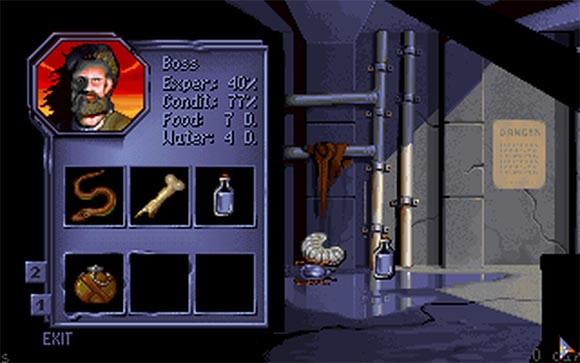
In the hidden gem Burntime, careful management of resources like water and disgusting food is key to success.
And Fallout 3 even has all the puzzle pieces in place. There are enough alternatives to Stimpacks, your limbs can become crippled, you can get various levels of radiation poisoning. All of those things are just spoiled by having drugs as an efficient and convenient solution. It’s really a shame to see that great potential go to waste by such simple yet fundamental mistake. Without it, Fallout 3 could have been a much more realistic and narratively engaging game.






The thing that came to mind reading this post was the “Rogue Factor,” i.e. “Losing is Fun.” I too, lamented for a more punishing and/or realistic treatment of the harshness of the wasteland. But I conceded the point after a corrupted save forced me to restart the game:
The first 2 hours of the game are -boring-.
Even as it is, you can save yourself into a pinch, and in the world you describe action from many hours of gameplay ago could effectively doom your character, so having the character ‘perma-die’ or ‘lose’ would need to be handled with more grace.
In addition, the first moments of the game would need to be more interesting and varied to support replay.
In fact, I think this would be a great way to approach the content of the game: One thing that bothered me was that “beating” the game took 6-8 hours, but there was all that other content out there. It felt weird to be doing things that weren’t winning. If it was more like, “Go out and live for as long as you can,” ala Roguelikes, and one of the potential routes led to a “good ending”, I think idly exploring the world would have been much more meaningful.
Interesting. I never had a situation where I got stuck. But I kept a huge library of savegames. How did that happen?
Having a more realistic treatment of survival doesn’t have to mean that you will get stuck more often. The effect could be non-threatening, but annoying to the player. For example, you could turn off quicktravelling when your character is hungry or tired. Simply making Stimpacks much more rare so you keep one or two for the darkest hour and live off food otherwise would be probably already enough. I’m merely suggesting that the topic should be addressed AT ALL.
I did two full playtroughs and played the beginning a couple of times. I didn’t find the first two hours boring, on the contrary. I’m curious, why did you find it boring and when did it stop being boring?
I wholeheartedly agree to your final suggestion. The main storyline is pretty weak. The game is by far more enjoyable when you just go out and explore all the random locations and sub-quests. In fact, I found myself deliberately avoiding progress in the main quest in order to be able to explore freely. But it’s a difficult task to design a game like that. The main problem is how to design an ending, how to give players a sense of closure once the wasteland has been explored?
Realistic management of food and liquids is something I’ve been working on recently. It’s a tricky element to add, especially if you want the game to have mainstream appeal. You have to wonder whether Fallout 3 would have been acceptable to everyone if there had been a requirement to keep refuelling your character. Minor annoyances resulting from neglect could, as you point out, have been the best approach.
I made the mistake of following the quests, even though I knew that might lead to an actual ending. But simply prolonging the game by developing my character seemed a little pointless. An interesting alternative game might be to make death inevitable in the end, either through a lack of resources or eventual radiation poisoning (with accuracy and other stats affected by your increasing infirmity). Survival would then become the benchmark by which a player can be judged when they eventually succumb. That style of play would probably need to jettison the main storyline, so that you might choose your starting location and some stats/skills and see how you long you could last.
Interesting! Can you share with us any details on the project you are working on?
I noticed that too tedious sustenance mechanics can scare away some players. But on the other hand, do you really think Fallout 3 is for a wide audience? I thought it was a rather hard-core RPG.
I like your idea with prolonging the survival. I really enjoy this kind of gameplay. It’s kinda funny how the original Story of Fallout 3 also lead to the inevitable death of you character. But since it was scripted and the story was so poor, it wasn’t really meaningful.
As an indie browser game my project isn’t in the Fallout 3 league, but I’m having a lot of fun with it. It’s nice to have complete control of all aspects of making a game. The game is very much focused on a realistic approach to survival, with death from dehydration taking about four days and from starvation in a few weeks. Drinking or eating small amounts can increase this but not indefinitely. Only providing sufficient daily calories and liquids will keep the character from eventual death. The effects of neglect are subtle but should remind players to at least seek out some food and water every now and then. I’d be very glad to let you know more when we’re closer to release, if you’re interested.
Fallout 3 seemed to really appeal to a lot of people I wouldn’t have expected to want to play it, although that may say something about the kinds of people I know rather than its target audience. I enjoyed it but definitely felt let down by the story, which reduced my sense of agency to the minimum required to allow me to feel in control, unless I had given up on the story and just wandered off on my own. With that level of freedom, my only goal would have been progression and collection. As Graham said above, how can it end meaningfully if you abandon the story?
I intend to play through it again when my memories of the game have dimmed, but to make every choice the opposite of my natural inclinations. That said, I fully expect this to make my experience of the game both more difficult and maybe even more hollow, somewhat like the emptiness of gunning down random citizens in GTA. I do look forward to seeing how an incredibly negative karma might affect the behaviour of the inhabitants.
I’m vaguely aware of the vast number of mods available for Fallout 3, so I expect one or more of those would supply an alternative experience which would be richer than just unguided exploration. That might be another approach to getting more out of the game.
Being forced to choose death at the end really was terribly weak. It was almost as though you were being talked into something you didn’t want to do by everyone around you. Like being shown a suit that you really don’t like, with all your family and friends agreeing with the salesman that it’s perfect for you, that it’s your fate to wear that awful suit. In the end you just give up and take the suit so that you can move on. Into the chamber, game over.
I know I could have chosen to do something else, but the game would have made me feel guilty…
I can understand why they probably chose early on not to explore that direction. Life-and-death character maintenance has a tendency to be extremely unenjoyable in many games because the fundamental activities of the game are simply not aligned with the lifecycle of reality. In many games, the activity you’re engaged in, and performing for enjoyment, is something like “exploring” or “fighting.” The base gameplay is just to fight as much as you can, or explore as much as you can, and maintenance tasks become extremely unenjoyable because they get in the way of what you “want” to be doing. Even worse, in reality these tasks take up pretty much all of people’s time — a normal person dedicates more than 2/3 of their life to acquiring sustenance and rest — so it’s hard to work them into a game routine that mostly revolves around some activity that would not on its own produce these benefits.
Where these mechanics tend to work well is in sims that actively immerse you in a realistic life cycle. In Harvest Moon, it’s extremely normal to eat breakfast, or to only go to stores during the day when they’re open, or to go home and sleep because you’re operating in a world where things operate by a “realistic” daily clock and your game routine centers around optimizing that routine. In Lost in Blue survival tasks are entertaining because they’re your primary goal. And in both cases the availability of the things you need to do these tasks isn’t a problem — in HM you have food and a place to rest because you’re a farmer and work out of your farmhouse, in LiB success in your primary tasks is the same thing as getting enough food and tools to survive.
What I think would’ve worked well with Fallout 3 is, instead of actually forcing players to perform these tasks to survive, just denote them using minor but obvious effects (debuffs) so that they weigh on the player’s mind. Give players a “tired” debuff after X minutes of gameplay without “resting” and only allow resting in “safe” locations like settlements. Give them “hungry” and “thirsty” debuffs that food and water remove but replace them with sickness-related debuffs when what they’ve eaten isn’t clean. Make all of these minor in mechanical effect but have them add up collectively to a reasonably large effect; make sure they’re very visible in the HUD, with icons or visual effects or both (so players are always aware of how tired they are), and make sure there’s no way to get rid of them besides the “correct” way (eating and drinking clean water and sleeping.) Then balance the game around the idea that the player will almost always have at least one, sometimes more of these and inform them clearly upfront that this’ll be true.
The end result should be that players both eagerly seek out food and water when they’re available, hoard them when they’re scarce (you want to make sure you can be well-rested and well-fed before a big fight or a major trek into the wilderness), and that they sympathize with other characters who describe their difficulties in eating, drinking, and resting.
Good point about survival mechanics getting in the way. As you pointed out, it depends on what kind of expectations players have. If they expect the kickass action title then obviously, survival would get in the way.
I’m not so sure about exploration though. Exploration, where you can go anywhere is boring. The fun thing abozt exploration is also to be confronted with places that are hard to reach and then gradually overcome these obstacles. I think survival mechanics can be a great way to create this kind of experience. Think of a desert where you need to pack a lot of resources in order to be able to cross it. When you just make it to the other side, it will feel so much more special.
The question would be if this is the kind of experience that fits to the expectations of a title like Fallout 3. I would argue that it does.
The “tired” debuff you described is similar to the “well rested” system that is already in the game. I agree with you that it could be more developed. I would only add a small correction to the system: Right now you can get the “well rested” status only by sleeping in towns. But “well rested” only lasts for 12 hours. This isn’t nearly enough to reach many of the dungeons. So it means that you rarely be “well rested” when you really need it. I thought that was silly. There ought to be alternatives to get “well rested” outside of towns. A tent maybe?
I wanted to share my video essay, which mentions this particular game, on the often troubled relationship between gaming and film.
http://www.youtube.com/watch?v=rPPmlM02yDU
Speaking of old school games in which day-to-day survival was not a guaranteed and in which you had to carefully manage resources like food, water, and medicine …
*cough* Oregon Trail *cough*
And we’ve ALL played it. There’s no excuse for it in Fallout 3.
Much to my excitement Fallout New Vegas is suppose to have a “survival” mode.
http://fallout.wikia.com/wiki/Fallout:_New_Vegas#Hardcore_mode
Oh, I’m so looking forward to this one.